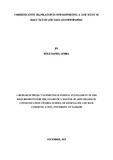| dc.description.abstract | This research investigated the level of retention of meaning and equivalence in translated
international news items from English to Kiswahili languages in the Daily Nation and Taifa
Leo Newspaper publications. Based on Nida and Newmark‟s structuralisation of news
discourse, theories of translation, equivalence and framing theories were compiled together as
a framework to map international news translation into a multi-level social context. The
research confirmed Nida‟s assertations in his dynamic equivalence theory which concludes
that all languages have the same capability of expressing by saying, anything that can be said
in a particular language can certainly be said in another language, with reasonable accuracy by
establishing equivalent points of reference in the receptor's culture and matching his cognitive
framework by restructuring the constitutive elements of the message. The tenets of these
theories served as a guideline and enabled the research to achieve its objectives. The study
aimed to find out the gaps in news translation researches, the role of equivalence in meaning
retention during translation as a factor of communication, how and why framing occurs
during news translation. Through Comparative and qualitative Content Analysis, discourse on
International news stories from Daily Nation, source text, and corresponding Taifa Leo,
Target Text, translations were reviewed. Interviews with different Nation Media Group Staffs
were also referred to as supportive evidences from media insiders, which expanded the
research scope to professional and organizational levels. The result of the study revealed that
among other entities, direct translations affected equivalence in the translations. The study
also revealed that reframing which often occurred during the translations altered the intended
meaning hence affecting the intended communication all together. From the reviews of the
news items it was discovered that most of the previous studies on news translation focused on
strategies at textual levels in order to suit target Kiswahili-speaking audiences‟ interest and
knowledge. The study also proved that it is possible to explore the social context behind
media organization‟s practice through studying international news translation, which could
help us better understand developing countries in a globalised world that the discourse power
is to be shared and varied. Data collection involved reviewing the Daily Nation and Taifa Leo
Internatinal News Segments. Discourse from newspapers and other existing secondary data
inform of books, masters exertations, theses, magazines, journals, seminar papers among
other was reviewed in the library and the findings presented in prose after comparative and
qualitative content analysis. The findings of the study will be useful to the editors and
translators of English-Swahili news items as the adoption of the reccomendations herein will
enable them reliable news translations. | en_US |

